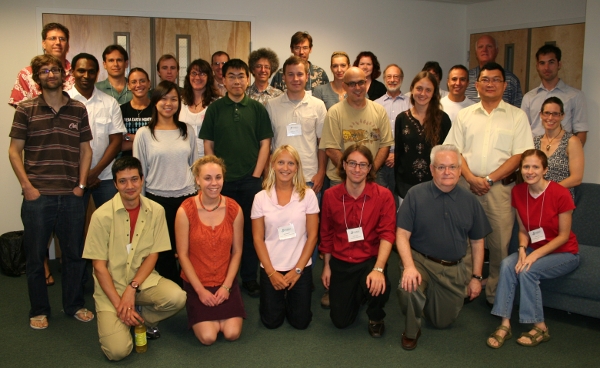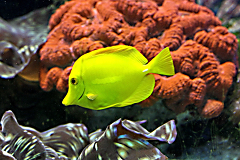| Description | Participants | Agenda | Summary | Products |
|---|
NIMBioS Investigative Workshop
Modeling Reef Ecosystems

Topic: Modeling sustainability of coral reef ecosystem services under multiple interacting stressors
Meeting dates: July 21-23, 2010
Organizers:
Susan H. Yee (U.S. EPA, Gulf Ecology Division);
Jerald S. Ault (Univ. of Miami, Rosenstiel Sch. of Marine & Atmospheric Science)
Objectives. Coral reef ecosystems are highly valued, but threatened by regional human population growth and serial over-exploitation. Human activities in the watershed and coastal zones must be dramatically altered to eliminate threats, but scientific and management efforts are often narrowly defined, making it challenging to predict the potential repercussions of decisions within a complex ecosystem under threat from multiple interacting stressors. This workshop evaluated the potential for development of a comprehensive coral reef systems model that links multiple interacting environmental stressors (e.g., water quality (nutrients, contaminants, sedimentation), exploitation, episodic events (i.e., hurricanes), climate changes (water temperature and ocean acidification), and vessel groundings) to the state and dynamics of reef ecosystems (i.e., reef-building corals, reef fish, sponges, algae, invertebrates, seagrasses, mangroves) stretching from coastal bays to coral reefs. To maximize relevancy to decision makers, the modeled reef ecosystem should include those attributes linked to the provision of ecosystem services (sustainable fisheries, shoreline protection, biodiversity). A systems model could be used to evaluate the environmental conditions under which the reef ecosystem or key ecosystem services are sustainable. Risk analysis could be used to evaluate environmental stressors or biological processes which have the greatest potential for impacting reef ecosystems, and therefore may be high-value targets for management decisions or future research. Finally, a comprehensive systems model would have enormous value to decision makers as a decision support tool to ensure that critical relationships and potential interactions are not overlooked when evaluating consequences of alternative decisions.
Evaluation report (PDF)
 Summary Report.
Key variables, processes, endpoints and methods to improve and integrate existing reef ecosystem models were evaluated so that they are more relevant to decision-makers over a range of scales, decision scenarios or locations. Participants represented diverse expertise including applied and theoretical mathematics, coral reef and fisheries modeling, and reef management. Relevant ecosystem services endpoints in terms of observable metrics were identified, as well as the corresponding reef attributes, processes, and stressors needing to be modeled. Mathematical approaches for quantifying tipping points, uncertainty in outcomes, and natural changes in the system versus those related to external pressures, all issues of high concern to reef management, were discussed. The group will write a synthesis paper of the workshop discussion. Two potential working groups formed: one to begin developing reef ecosystem models that incorporate multiple stressors, and a second to examine the appropriate time-scales involved in the decision processes.
Summary Report.
Key variables, processes, endpoints and methods to improve and integrate existing reef ecosystem models were evaluated so that they are more relevant to decision-makers over a range of scales, decision scenarios or locations. Participants represented diverse expertise including applied and theoretical mathematics, coral reef and fisheries modeling, and reef management. Relevant ecosystem services endpoints in terms of observable metrics were identified, as well as the corresponding reef attributes, processes, and stressors needing to be modeled. Mathematical approaches for quantifying tipping points, uncertainty in outcomes, and natural changes in the system versus those related to external pressures, all issues of high concern to reef management, were discussed. The group will write a synthesis paper of the workshop discussion. Two potential working groups formed: one to begin developing reef ecosystem models that incorporate multiple stressors, and a second to examine the appropriate time-scales involved in the decision processes.
Products
Publications
Yee SH, Dittmar JA, Oliver LM. 2014. Comparison of methods for quantifying reef ecosystem services: A case study mapping services for St. Croix, USVI. Ecosystem Services, 8: 1-15. [Online]
Yee SH, Carriger JF, Bradley P, Fisher WS, Dyson B. 2014. Developing scientific information to support decisions for sustainable coral reef ecosystem services. Ecological Economics. [Online]
Bode M, Armsworth PR, Fox HE, Bode L. 2012. Surrogates for reef fish connectivity when designing marine protected area networks. Marine Ecology Progress Series, 466: 155-166. [Online]
Zychaluk K, Bruno JF, Clancy D, McClanahan TR, Spencer M. 2012. Data-driven models for regional coral-reef dynamics. Ecology Letters, 15(2): 151-158. [Online]
Lennox GD, Dallimer M, Armsworth PR. 2010. Landowners' ability to leverage in negotiations over habitat conservation. Theoretical Ecology, 5(1): 115-128. [Online]
NIMBioS Investigative Workshops focus on broad topics or a set of related topics, summarizing/synthesizing the state of the art and identifying future directions. Workshops have up to 35 participants. Organizers and key invited researchers make up half the participants; the remaining participants are filled through open application from the scientific community. Open applicants selected to attend are notified by NIMBioS within two weeks of the application deadline. Investigative Workshops have the potential for leading to one or more future Working Groups. Individuals with a strong interest in the topic, including post-docs and graduate students, are encouraged to apply. If needed, NIMBioS can provide support (travel, meals, lodging) for Workshop attendees, whether from a non-profit or for-profit organization.
A goal of NIMBioS is to enhance the cadre of researchers capable of interdisciplinary efforts across mathematics and biology. As part of this goal, NIMBioS is committed to promoting diversity in all its activities. Diversity is considered in all its aspects, social and scientific, including gender, ethnicity, scientific field, career stage, geography and type of home institution. Questions regarding diversity issues should be directed to diversity@nimbios.org. You can read more about our Diversity Plan on our NIMBioS Policies web page. The NIMBioS building is fully handicapped accessible.
←Back to previous pageNIMBioS
1122 Volunteer Blvd., Suite 106
University of Tennessee
Knoxville,
TN 37996-3410
PH: (865) 974-9334
FAX: (865) 974-9461
Contact NIMBioS


